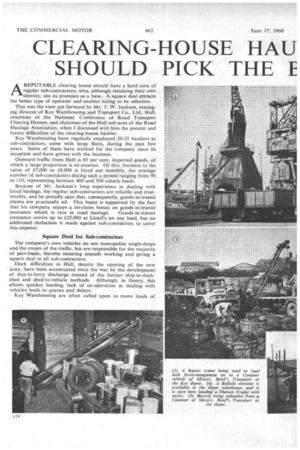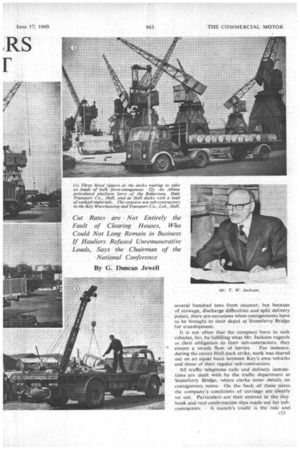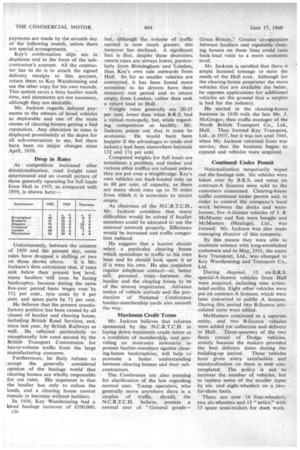CLEARING-HOUSE HA U RS SHOULD PICK THE F
Page 60

Page 61

Page 62

If you've noticed an error in this article please click here to report it so we can fix it.
Cut Rates are Not Entirely the Fault of Clearing Houses, Who Could Not Long Remain in Business If Hauliers Refused Unremunerative Loads, Says the chairman of the
.National Conference
By G. Duncan Jewell AREPUTABLE clearing house should have a hard core of regular .sub-contractors, who, although retaining their own identity, use its premises as a base. A square deal attracts the better type of operator and enables'hiring to be selective.
This was the view put forward by Mr. T. W. Jackson, managing director of Key Warehousing and Transport Co., Ltd., Hull, chairman of the National Conference of Road Transport Clearing Houses, and chairman of the Hull sub-area of the Road Haulage Association, when I discussed with him the present and future difficulties of the clearing-house haulier.
Key Warehousing have regularly employed 20-25 hauliers as sub-contractors, some with large fleets, during the past few years. Some of them have worked for the company since its inception and have grown with the business.
Outward traffic from Hull is 85 per cent. imported goods, of which a large proportion is ex-steamer. Of this, business to the value of £7,000 to £8,000 is hired out Monthly,. the average number of sub-contractors during such a period ranging from 90 to 110, representing between 400 and 500 vehicle loads.
Because of Mr. Jackson's long experience in dealing with hired haulage, the regular sub-contractors are reliable and trustworthy, and he proudly says that, consequently, goods-in-transit claims are practically nil. This boast is supported by the fact that his company enjoys a no-claim bonus on goods-in-transit insurance which is rare in road haulage. Goods-in-transit insurance covers up to £25,000 at Lloyd's on any load, but no additional deduction is made against sub:-contractors to cover' this expense.
Square Deal for Sub-contractors
The company's own vehicles do not monopolize single-drops and the.creain of the traffic, but are responsible for the majority of part-loads, thereby ensuring smooth working and giving a square deal to all sub-contractors.
Dock difficulties in Hull, despite the opening of the new quay, have been accentuated since the war by the development of ship-to-lorry, discharge instead of the former ship-to-dockshed and shed-to-vehicle methods. Although, in theory, this allows quicker loading, lack of co-operation in dealing with vehicles leads to queues and delays.
Key Warehousing are often called upon to move loads of several hundred tons frorn steamer, but because of stowage, discharge difficulties and Split delivery points, there are occasions when ccinsignMents have to. be brought to their depot at Storieferry Bridge for transhipment.
it is not often that the company have to seek vehicles, for, bY,fulfilling what Mr. Jackson regards as .their :.obligation .tO their Sub-contractors, they
ensure a steady flow of lorries. For instance, during the recent Hull dock strike, work Was shared out on an equal basis between Key's own-vehicles
and those of their regular sub-contractors. . •
• All traffic telephone calls and 'deliveiy instructions are dealt with by the trafficdepartment at StorieferrY Bridge, where .clerks Enter details on consignment :notes. On the • back of these' notes the company's conditions of carriage are clearly set out. Particulars. are then entered in thedaybook and rate confirmation slips made out for
sub
ontractdis. A month's eredif IS the lade and payments are made by the seventh day of the following month, unless there are special arrangements.
Key's confirmation slips are in duplicate and in the form of the subcontractor's account. All the contractor has to do is to attach the signed delivery receipts to this account, return them to Key Warehousing and use the other copy for his own records. This system saves a busy haulier much time, and statements are not necessary, although they are desirable.
Mr. Jackson regards delayed payments to the owners of hired vehicles as deplorable and one of the main causes of clearing houses getting a bad reputation. Any alteration in rates is displayed prominently at the depot for all sub-contractors to see, but there have been no major changes since April, 1959.
Drop in Rates As competition increased after denationalization, road freight rates deteriorated and an overall picture of those generally operating for full loads from Hull in 1955, as compared with 1959, is shown here:— Unfortunately, between the autumn of 1959 and the present day, some rates have dropped a shilling or two on those shown above. It is Mr. Jackson's firm conviction that, if rates sink below their present low, level, many hauliers will soon be facing bankruptcy, because during the same five-year period basic wages rose by 17+ per cent., tyre costs by 6 per cent, and spare parts by 71 per cent.
He believes that the present unsatisfactory position has been caused by all classes of haulier and clearing house, including British Road Services, and, since last year, by British Railways as well. He referred particularly to exceptionally low rates quoted by the British Transport Commission for heavy-volume traffic from the large manufacturing concerns.
Furthermore, he flatly refuses to _accept the generally considered opinion of the haulage world that clearing houses are wholly responsible for cut rates. His argument is that the haulier has only to srefuse the loads, and a clearing house cannot remain in business without hauliers. In 1956, Key Warehousing had a hired haulage turnover of £100,000, c26 but, although ihe volume of traffic carried is now much . greater, this turnover has declined. A significant fact is that, despite these decreases, return rates are always lower, particularly from Birmingham and London, than Key's own rate outwards from Hull. -So. far as smaller vehicles are concerned, it has been found more economic to let drivers have their statutory rest period and to return empty from London, rather than seek a return load to Hull.
Freight rates generally are 20-25 per cent, lower than when B.R.S. had a virtual monopoly, but, while regarding competition as healthy, Mr. Jacksonpoints out that it must be economic. He would have been happier if the advantages to trade and industry had been -somewhere between 124 and 174per cent.
Computed weights for full loads are sometimes a problem, and timber and various other traffics are refused unless they are put over a weighbridge. Key's own vehicles are back-loaded only up to 60 per cent, of capacity, as there are many short runs up to 70 miles from which it is economic to return empty.. . As chairman of the N.C.R.T.C.H., Mr. Jackson considers that many difficulties would be solved if haulier members could be educated to use the national network properly. Efficiency would be increased and traffic congestion reduced.
He suggests that a haulier should select a particular clearing house which specializes in traffic to his own base and he should look upon it as if it were his own. He also .considers regular telephone contact—or, better still, personal visits—between . the haulier and the clearing house to be of the utmost importance. Advance notice of vehicle arrivals and the production of National Conference haulier-membership cards also smooth the way.
Maximum Credit Terms Mr. Jackson believes that reforms sponsored by the N.C.R.T.C.H. in laying down maximum credit terms as a condition of membership, and providing an insurance indemnity to • protect haulier-members against clearing-house bankruptcies, will help to promote a better understanding between clearing houses and their subcontractors.
The Conference are also pressing for clarification of the law regarding normal user. Tramp operators, who generally move anywhere there is a surplus of traffic, should, the N.C.R.T.C.H. believe, possess a normal user of "General goods- Great Britain." Greater co-operation between hauliers and reputable clearing houses on these lines could raise back-load. rates to a more economic level.
Mr. Jackson is satisfied that there is ample licensed tonnage to meet the needs of the Hull area. Although for the clearing-house proprietor the more vehicles that are available the better, he opposes applications for additional vehicles on the ground that a surplus is bad for the industry.
He started in the clearing-house business in 1930 with the late Mr. J. McGregor, then traffic manager of the North British Transport Co., Ltd., Hull. They formed Key Transport, Ltd., in 1937, but it was not until 1945, when Mr. Jackson returned from war service, that the business began to expand and vehicles were acquired.
Continued Under Permit Nationalization temporarily wiped out the haulage side. Six vehicles were taken over by B.R.S. and some on contract-A licences were sold to the customers concerned. Clearing-house traffic continued under permit and, in order to control the company's local work between the docks and ware houses, five A-licence vehicles of J. B. McMaster and Son were bought and McMasters. (Haulage), Ltd., was formed. Mr. Jackson was also made managing director of this company.
By this means they were able to maintain contact with long-established customers and in May, 1951, the name Key Transport, Ltd., was changed to Key Warehousing and Transport Co., Ltd.
During disposal, 15 ex-B.R.S. special-A-licence vehicles from Hull were acquired, including nine articu lated outfits. Eight other vehicles were put on contract-A licences, which were later converted to public A licences. During ,this period two B-licence articulated units were added.
McMasters continued as a separate entity, and two B-licence vehicles were added for collection and delivery in Hull. Three-quarters of the two fleets consist of Dodge vehicles, mainly because the makers provided.
the best delivery dates during the building-up period. These vehicles have given every satisfaction and standardization on them is now contemplated. The policy is not to increase the number of vehicles, but to replace some of the smaller types by sixand eight-wheelers on a twofor-three basis.
There are now 16 four-wheelers,. two six-wheelers and 13 " artics," with 13 spare semi-trailers for dock work.
























































































































